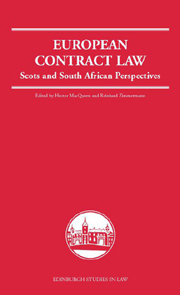Book contents
- Frontmatter
- Contents
- Preface
- List of Contributors
- List of Abbreviations
- 1 Ius Commune and the Principles of European Contract Law: Contemporary Renewal of an Old Idea
- 2 Good Faith
- 3 Offer, Acceptance, and the Moment of Contract Formation
- 4 The Battle of Forms
- 5 Agency
- 6 Threats and Excessive Benefits or Unfair Advantage
- 7 Interpretation
- 8 Third-Party Contracts
- 9 Payment
- 10 Specific Performance and Special Damages
- 11 Termination for Breach of Contract
- 12 Assignment
- 13 Capitalisation of Interest
- Appendix: The Principles of European Contract Law
- List of Cases
- Index
2 - Good Faith
Published online by Cambridge University Press: 05 July 2013
- Frontmatter
- Contents
- Preface
- List of Contributors
- List of Abbreviations
- 1 Ius Commune and the Principles of European Contract Law: Contemporary Renewal of an Old Idea
- 2 Good Faith
- 3 Offer, Acceptance, and the Moment of Contract Formation
- 4 The Battle of Forms
- 5 Agency
- 6 Threats and Excessive Benefits or Unfair Advantage
- 7 Interpretation
- 8 Third-Party Contracts
- 9 Payment
- 10 Specific Performance and Special Damages
- 11 Termination for Breach of Contract
- 12 Assignment
- 13 Capitalisation of Interest
- Appendix: The Principles of European Contract Law
- List of Cases
- Index
Summary
GOOD FAITH AND FAIR DEALING IN PECL
Good faith is a powerful concept in PECL. Almost from the outset, Article 1:201 PECL declares that “each party must act in accordance with good faith and fair dealing”, and that this “duty” may not be excluded or limited by the parties. Comment A says that the Article “sets forth a basic principle running through the Principles”, while Comment B adds: “Its purpose is to enforce community standards of decency, fairness and reasonableness in commercial transactions.” Even the recognition of parties' freedom to enter into a contract and determine its contents is made “subject to the requirements of good faith and fair dealing” (Article 1:102 PECL). Amongst the various purposes for which the Principles are to be interpreted and developed, “the need to promote good faith and fair dealing” is listed first, ahead of “certainty in contractual relationships and uniformity of application” (Article 1:106 PECL).
The constant conjunction in PECL of good faith with fair dealing indicates that overall an objective standard is intended, rather than a subjective one of simple honesty. Comment E to Article 1:201 PECL says:
“Good faith” means honesty and fairness in mind, which are subjective concepts. … “Fair dealing” means observance of fairness in fact which is an objective test …
There are links to other concepts in PECL. Comment A says that Article 1:201 PECL is a companion to the Article on usages, which makes binding between the parties agreed, established or generally applicable and reasonable usages and practices (Article 1:105 PECL). In this way are ideas about “community standards”, as well as the standards the parties set themselves, articulated in the actual text.
- Type
- Chapter
- Information
- European Contract LawScots and South African Perspectives, pp. 43 - 73Publisher: Edinburgh University PressPrint publication year: 2006



